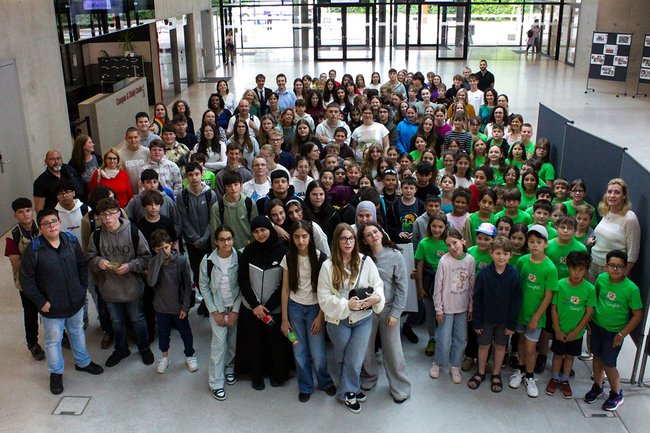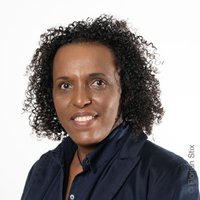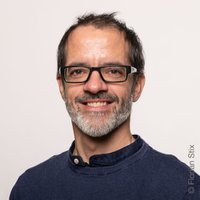Festival for Mobility Research
School Workshops at the St. Pölten UAS

In the research project “CLEA – Check and Leave for Environmental Action”, which is coordinated by the St. Pölten UAS, school pupils aged between 6 and 17 jointly worked on questions of sustainable and inclusive mobility and developed games designed to sustainably raise climate protection awareness. In this endeavour, they received support from St. Pölten UAS researchers. This week, the pupils presented the results of the project at the UAS within the framework of a research festival. More than 150 pupils participated in the event.
The project’s objective is to influence mobility behaviours in the long term, thus making a positive contribution to the mobility transition. The schools had the opportunity to take part in the format thanks to a cooperation grant for independent school projects on the topic of sustainable mobility.
World Cafés and Climate-Friendly Travel Game
“At the closing event, we came together with our project partner schools and companies to reflect on our successful cooperation in the project over two years, engage in discussion, and present the results. In the form of a World Café, the pupils vividly presented the research activities carried out in the project”, explains project coordinator Hirut Grossberger, Senior Researcher at the Carl Ritter von Ghega Institute for Integrated Mobility Research of the St. Pölten UAS.
In the project, the pupils and researchers jointly developed a “Climate-Friendly Travel Game” that they introduced within the framework of the closing ceremony. In addition, several mobility stations were distributed over the campus.
Self-Planned Scenario for School Trip
At the research festival, the school pupils themselves planned a route for a potential school outing – equipped with paper maps. They drew the route into the map, calculated the distance to be covered, established elevation, and estimated the required time. They did this using basic physical and mathematical concepts such as speed, path-time calculation, and scale calculation.
In addition, they were introduced to the cargo bicycle of the St. Pölten UAS and presented a poster on the use of cargo bicycles including their pros and cons.
Project Teaches Background Knowledge
“Within the framework of the project’s workshops and excursions, we discussed the topic of mobility behaviours and their implications for our climate and environment with the pupils. They got to know different research methods and actively applied some of them as well. Based on simple examples, they learned how to calculate, reflect on, and discuss carbon footprints, among other things”, says Grossberger.
Social/societal aspects of mobility were also broached in the project. The contents of the workshops were individually designed together with the pupils’ teachers beforehand and adjusted to the different age levels.
17 educational institutions were involved in the project, with seven schools from the region participating directly. In order to inspire even more pupils for sustainable and inclusive mobility, three nursery schools and two elementary schools from Vienna, two PTS (“Polytechnische Schule”) and one secondary academic school from Lower Austria, three elementary schools from Styria and Vienna, and a secondary academic school from Styria were enabled to implement their own school projects with the help of a cooperation grant from the project.
Field Research and Development of a Game Prototype
Equipped with their newly acquired knowledge, the pupils then got to conduct their own research. They carried out surveys in their immediate environment and found out what mobility in general means to their family, neighbours, and friends and what/how they think about sustainable mobility. In a workshop, the collected data was then analysed and the results interpreted together with scientists.
“The project makes an important contribution to strengthening the position of the sustainable mobility topic and raising young people’s awareness. While it is mainly addressed to children and adolescents, it also reaches their families and environment through the methods applied. Moreover, we awakened pupils’ interest in technical, economic, and social innovation and encouraged them to choose educational paths in this direction”, adds Grossberger.
Project CLEA – Check and Leave for Environmental Action
The project is coordinated by the Carl Ritter von Ghega Institute for Integrated Mobility Research at the St. Pölten UAS. Partners at the UAS are the Ilse Arlt Institute for Social Inclusion Research and the Institute of Creative\Media/Technologies. Business partners are Goodville Mobility e.U. and Königreich der Eisenbahnen GmbH.
The partner schools in the project were: Allgemeine Sonderschule Hainfeld, Allgemeine Sonderschule Traisen, BG/BRG Lilienfeld, BG/BRG St. Pölten Josefstraße, NMS Theodor Körner St. Pölten, Volksschule Hainfeld, and Volksschule Traisen.
The project is carried out within the framework of the programme “Talente Regional” of the Austrian Research Promotion Agency (FFG) and the Federal Ministry of Innovation, Mobility and Infrastructure (BMIMI).

FH-Prof. Dipl.-Ing. Dipl.-Ing. Dr. Hirut Grossberger
Senior Researcher Carl Ritter von Ghega Institute for Integrated Mobility Research International Coordinator Department of Rail Technology and Mobility